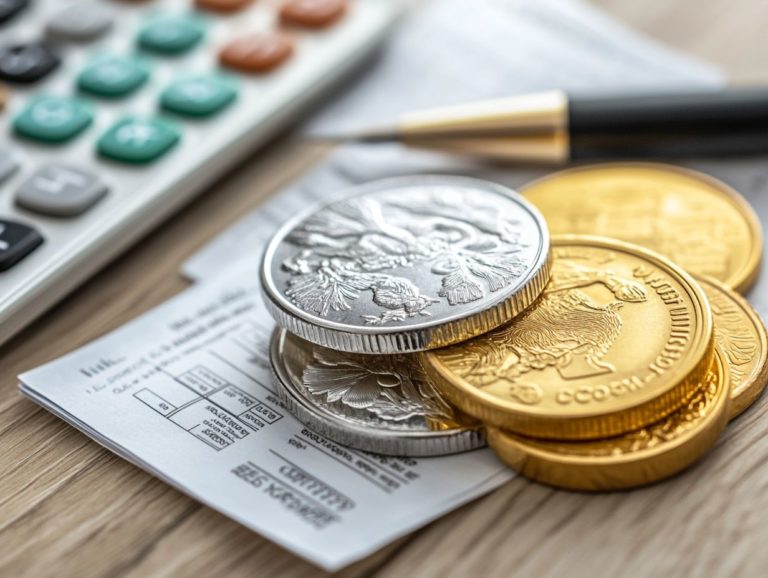Tax Implications of Precious Metals Gifts
When you think about gifting precious metals like gold or silver, their beauty and value can be incredibly alluring. However, giving these tangible treasures introduces complex tax implications for both you and the recipient.
It s crucial to understand capital gains tax and gift tax. The recipient must also navigate the nuances of income tax considerations. This article guides you through the tax responsibilities involved, explains how to report these gifts properly, and highlights additional factors to consider regarding inheritance and estate planning.
You want your precious gifts to bring joy, not tax headaches!
Contents
- Key Takeaways:
- Tax Implications for the Giver
- Tax Implications for the Receiver
- How to Report Precious Metals Gifts on Taxes
- Other Considerations for Precious Metals Gifts
- Frequently Asked Questions
- What are the tax implications of giving precious metals as gifts?
- Do I need to report the gift of precious metals on my tax return?
- What is the annual exclusion amount for gifts?
- Are there any exceptions to the gift tax for precious metals?
- How are capital gains taxes affected if I gift precious metals?
- What happens to the tax basis of the precious metals when they are gifted?
Key Takeaways:

- Givers of precious metals gifts may be subject to capital gains and gift tax, depending on the value and type of gift given.
- Recipients of precious metals gifts may need to report the gift as income and may also be subject to capital gains tax when selling the gift.
- Proper documentation and reporting, as well as considering inheritance and estate planning, are important factors to keep in mind when giving or receiving precious metals gifts.
What are Precious Metals Gifts?
Precious metals gifts, like gold, silver, and platinum, are more than just tokens of affection; they hold significant value and meaning. This guide delves into the nuances of gifting these valuable assets, shedding light on their appeal to both investors and collectors.
Understanding the implications of gifting physical metals can greatly influence your investment portfolio and financial strategies. This is particularly true when it comes to tax obligations and asset valuation.
In a world increasingly drawn to tangible assets, the charm of precious metals gifts is unquestionable. These metals symbolize love and friendship while boasting substantial market value, making them enticing options for those interested in collectibles.
Gold, often seen as a safe haven during economic uncertainty, tends to appreciate over time. Silver, with its industrial applications, can drive demand, while the rarity of platinum adds to its desirability.
Gifting these metals can evoke profound emotional responses, marking milestones or deep relationships. They often become treasured heirlooms. The significance of these gifts transcends sentiment; they resonate with investment strategies, appealing to discerning individuals looking to diversify their assets while indulging in the beauty of jewelry or collectible coins.
Tax Implications for the Giver
When considering gifting precious metals, it’s essential to grasp the tax implications for yourself as the giver. Various factors can significantly influence your financial landscape and tax reporting obligations.
The IRS, or the tax agency in the United States, has detailed regulations concerning gift tax and capital gains tax that you need to follow, especially regarding valuable assets like gold and silver.
By navigating these rules effectively, you can ensure compliance while optimizing your financial strategy be it minimizing tax liabilities or exploring tax-deferred accounts.
Capital Gains Tax and Gift Tax
Understanding both capital gains tax and gift tax is vital to protect your gifts. These taxes can significantly impact the value of the gift and your financial responsibilities. The IRS sets specific tax rates that apply to these transactions, and overlooking them can lead to substantial tax liabilities.
For example, when you gift precious metals like gold or silver, any increase in value since the original purchase could trigger capital gains tax when sold or transferred. This means the recipient might face unexpected tax burdens if they decide to sell the metals at a profit later on. It’s important to be aware of understanding the tax code as it relates to precious metals to avoid surprises.
Conversely, the gift tax comes into play when the total value of your gifts surpasses the annual exclusion limit. This can create additional financial repercussions for you as the donor. Being mindful of these factors can enhance your tax planning efforts. This allows you to employ strategies such as gifting within limits or establishing trust funds to minimize tax liabilities and maximize the financial advantages of your gifts.
Tax Implications for the Receiver

Receiving precious metals as gifts introduces a complex array of tax implications that you must navigate with care to avoid any unwelcome surprises. These implications largely center on income tax and capital gains tax, especially if you choose to sell the gifted assets in the future.
It’s essential to understand the fair market value at the time of the gift. This value will dictate the capital gains tax you may face should a taxable event arise later on.
Income Tax and Capital Gains Tax
Income tax and capital gains tax are crucial considerations for anyone receiving gifts of precious metals. These taxes shape the financial responsibilities associated with your new asset. When you eventually sell that gifted treasure, the fair market value at the time of gifting will determine your capital gains tax obligations. Therefore, keeping precise records for tax reporting is essential.
By understanding these tax responsibilities, you not only comply with the Internal Revenue Service s requirements but also maximize your financial outcomes. Recognizing income tax implications can save you money, especially if you consider monetizing the asset later.
The IRS stipulates that any increase in value from the moment of gifting to the time of sale is subject to capital gains tax. This heightens the need for thorough documentation, as neglecting to report this accurately could lead to significant penalties that might negatively impact your financial standing.
Seek guidance from a tax professional to navigate these complexities. Doing so helps you achieve a clearer understanding of how these gifts might influence your overall tax liabilities.
How to Report Precious Metals Gifts on Taxes
Reporting gifts of precious metals on your taxes requires a thorough understanding of the forms and documentation mandated by the Internal Revenue Service (IRS). Neglecting this responsibility can lead to complications and unwanted penalties.
You’ll need to navigate various tax reporting guidelines to ensure that both the giver and recipient adhere to the regulations governing capital assets like gold, silver, and platinum. Understanding the tax consequences of buying precious metals abroad is crucial. This guide provides essential steps to effectively document and report such gifts, ensuring compliance and keeping you informed.
Forms and Documentation
The forms and documentation required for tax reporting of precious metals gifts can profoundly influence how you, as both giver and receiver, fulfill your tax obligations in accordance with IRS guidelines. Completing and submitting these forms accurately is crucial for ensuring compliance and avoiding potential penalties from misreporting or inaccuracies.
To begin with, IRS Form 709 is critical for reporting gifts that exceed the annual exclusion limit, which frequently includes valuable precious metals. A detailed appraisal may be necessary to substantiate the value at the time of gifting. The IRS mandates precise reporting of fair market value. Both parties should also be aware of any state tax implications, as various states may impose their own regulations that interact with federal guidelines. For a comprehensive understanding, consider reviewing the tax landscape for precious metals in the next decade.
Adopting this comprehensive approach to understanding the necessary documentation can streamline the tax reporting process and safeguard both givers and receivers from unforeseen liabilities.
Other Considerations for Precious Metals Gifts

Beyond immediate tax implications, consider several other factors when gifting precious metals, especially within the realms of inheritance and estate planning.
Donating these metals to a charitable organization can provide unique tax advantages. Understanding the long-term consequences of such gifts can enhance your estate planning strategy.
A thorough understanding of these elements will help maximize your earnings while ensuring that all your tax obligations are effectively managed.
Contact a tax professional today to ensure you re making the most of your precious metals gifts!
Summary: This guide covers the tax implications of transferring precious metals, how to report them, and other considerations like estate planning and charitable donations. Understanding these aspects will help you navigate your responsibilities and maximize benefits.
Inheritance and Estate Planning
Inheritance and estate planning involving precious metals presents a unique blend of challenges and opportunities. This is especially true when considering the tax implications that can impact the distribution of your capital assets. Grasping how gifts of gold, silver, and other precious metals interact with estate taxes and inheritance laws can significantly shape your overall financial strategy. This guide will help you navigate these complexities and empower you to make informed decisions about gifting to family members or charitable organizations.
Navigating the intricate landscape of tax regulations is crucial if you’re considering incorporating such assets into your estate plans. For example, the IRS has specific guidelines regarding the valuation and reporting of precious metals, including understanding tax credits related to precious metals, which can dramatically influence estate tax calculations.
You might also explore strategies like establishing trusts or donating these assets to charities. These strategies could allow for valuable tax deductions while fulfilling your philanthropic aspirations. Understanding these nuances refines your planning approach and ensures that cherished family heirlooms are preserved for future generations, maximizing their value without paying extra taxes.
Frequently Asked Questions
Here are some common questions about gifting precious metals:
What are the tax implications of giving precious metals as gifts?
The value of the gift will be subject to gift tax if it exceeds the annual exclusion amount set by the IRS.
Do I need to report the gift of precious metals on my tax return?
Yes, any gift worth more than the annual exclusion amount must be reported on IRS Form 709.
What is the annual exclusion amount for gifts?
In 2019, the annual exclusion amount for gifts is $15,000 per person. This means you can give up to $15,000 worth of precious metals to someone without incurring gift tax.
Are there any exceptions to the gift tax for precious metals?
Yes, gifts made to a spouse or a qualified charity are not subject to gift tax, regardless of the value.
How are capital gains taxes affected if I gift precious metals?
If the gift recipient sells the precious metals and incurs a capital gain, they will be responsible for paying the applicable taxes. However, if you gift the precious metals at a loss, neither you nor the gift recipient can claim the loss on your tax return.
What happens to the tax basis of the precious metals when they are gifted?
The recipient’s tax basis for the gifted precious metals will be the same as yours at the time of the gift. This means they will be responsible for paying capital gains tax on any appreciation in value since the original purchase.
To ensure your estate planning is effective, consult with a financial advisor about your unique situation and make the most of your assets.














